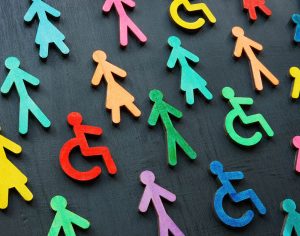Perhaps the first sound you heard this morning was your alarm ringing, telling you to get up and get ready for work. Pause for a moment. Imagine, if you can, what it would be like not being able to hear anything.
According to the National Institute for Deaf People (RNID), 12 million adults in the UK are deaf, have hearing loss or tinnitus. The RNID reports that an estimated 1.2 million adults in the UK have hearing loss severe enough to be unable to hear most conversational speech.
There’s a whole range of people who are deaf. Those born deaf learn signing and then British Sign Language (BSL) — those who become deaf struggle.
Experiencing hearing loss
You or someone you know at home or work may be experiencing hearing loss. It can occur gradually without a person realising it’s happening because they’re unaware of the signs. The National Health Service say common signs of hearing loss include:
- difficulty hearing clearly and misunderstanding what people are saying,
- asking others to repeat themselves,
- difficulty hearing on the phone,
- struggling to keep up with a conversation,
- feeling tired or stressed after having to concentrate while listening.
People experiencing hearing loss may reach a stage where they get exhausted trying to listen and translate what people are saying. Sadly, many say they feel “stupid” when they get it wrong. As a result, their confidence goes down, and they begin to withdraw from group conversations, work-related activities, and social events.
Employees who experience severe hearing loss leave their jobs. Often, their colleagues, let alone managers, have little or no idea about their reasons for leaving. But things don’t have to be that way.
Taking action
Under the Equality Act 2010, employers must make ‘reasonable adjustments’ for people disabled by hearing loss. Employers must ensure they are not put at a ‘substantial disadvantage’ compared to hearing people. Such adjustments may include:
- adjusting the layout of a meeting room and using good lighting to help everybody see each other clearly,
- modifying a job to take hearing loss needs into account and
- using a loop system and other technologies that transmit sound directly into hearing aids.
Employers can apply for a UK Government Access to Work grant to make reasonable adjustments. The grant also covers the cost of hiring interpreters for those fluent in BSL or who need a lipspeaker.
Seven tips for communicating better with colleagues with hearing difficulties
It’s easy to overlook the enormous effort that people who are deaf or experiencing severe hearing loss make to communicate. You can reciprocate by:
- Finding a suitable place to talk away from noise. Avoid standing in front windows or bright light to prevent shadows from obscuring your face.
- Ensuring you have their attention when speaking so they know you are starting a conversation.
- Rephrasing what you have said when necessary.
- Not mumbling or waffling. Speak clearly and use plain English.
- Writing things down on paper or device screens when required. Provide hard copies of essential information for meetings.
- Using an interpreter when required.
- Being inclusive by learning basic signs like ‘hello’, ‘please’ and ‘thank you’.
Also, when asked to repeat something, never say, “It doesn’t matter,” because it does matter.
We all want to be heard and understood. When we take action to make the lives of colleagues with hearing disabilities easier, we create a genuinely inclusive workplace for everyone.

































